中西方商务礼仪(英文)
- 格式:docx
- 大小:14.09 KB
- 文档页数:6
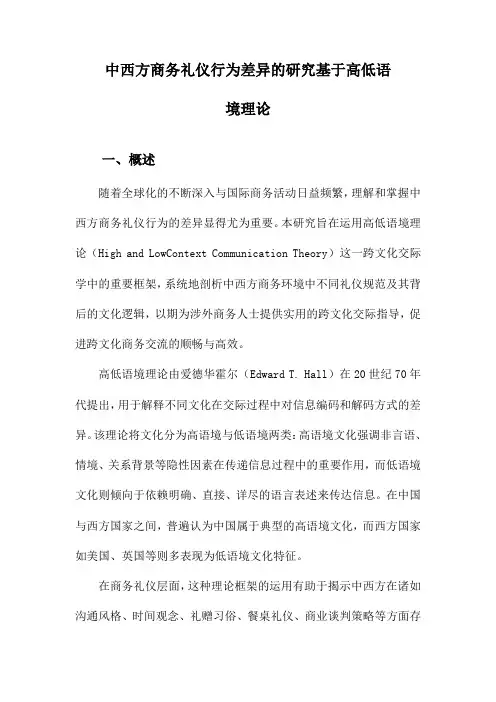
中西方商务礼仪行为差异的研究基于高低语境理论一、概述随着全球化的不断深入与国际商务活动日益频繁,理解和掌握中西方商务礼仪行为的差异显得尤为重要。
本研究旨在运用高低语境理论(High and LowContext Communication Theory)这一跨文化交际学中的重要框架,系统地剖析中西方商务环境中不同礼仪规范及其背后的文化逻辑,以期为涉外商务人士提供实用的跨文化交际指导,促进跨文化商务交流的顺畅与高效。
高低语境理论由爱德华霍尔(Edward T. Hall)在20世纪70年代提出,用于解释不同文化在交际过程中对信息编码和解码方式的差异。
该理论将文化分为高语境与低语境两类:高语境文化强调非言语、情境、关系背景等隐性因素在传递信息过程中的重要作用,而低语境文化则倾向于依赖明确、直接、详尽的语言表述来传达信息。
在中国与西方国家之间,普遍认为中国属于典型的高语境文化,而西方国家如美国、英国等则多表现为低语境文化特征。
在商务礼仪层面,这种理论框架的运用有助于揭示中西方在诸如沟通风格、时间观念、礼赠习俗、餐桌礼仪、商业谈判策略等方面存在的显著差异。
例如,中国商务交往中重视关系的建立与维护,倾向于通过含蓄表达、暗示及长期关系中的默契来理解对方意图,而西方商务环境更注重契约精神和明确的条款说明,强调直接、清晰的口头与书面沟通。
同样,对于时间管理,中国商务文化往往体现出更为灵活、注重人情的特性,而西方则严格遵守时间约定,视其为尊重他人与效率的体现。
本研究将首先概述高低语境理论的核心概念与分类依据,继而结合具体实例,深入探讨中西方商务礼仪行为在各个关键环节中的异同,以及这些差异如何受到各自文化语境特性的深刻影响。
研究不仅停留在现象描述层面,还将尝试挖掘造成这些差异的文化根源,如历史传统、社会结构、价值观等,并探讨在实际商务交往中如何恰当地应对和适应这些差异,以提升跨文化商务沟通的效果。
本研究以高低语境理论为切入点,通过对中西方商务礼仪行为差异的系统梳理与分析,旨在为跨国商务实践提供理论支撑与实践指导,助力全球商务参与者跨越文化鸿沟,实现更加和谐、有效的跨文化商务1. 研究背景与意义在全球化的今天,中西方商务交流与合作日益频繁,商务礼仪作为文化交流的重要组成部分,其差异性和共性逐渐受到学者和商界人士的广泛关注。
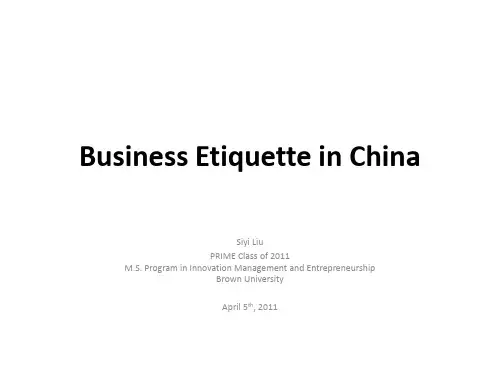

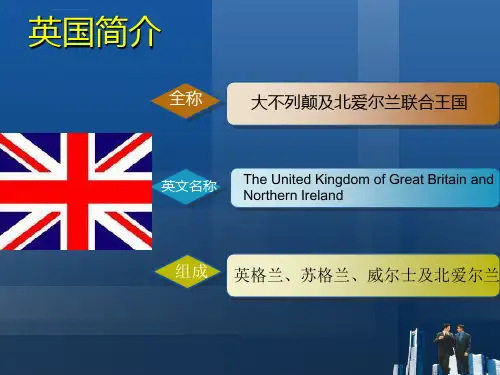
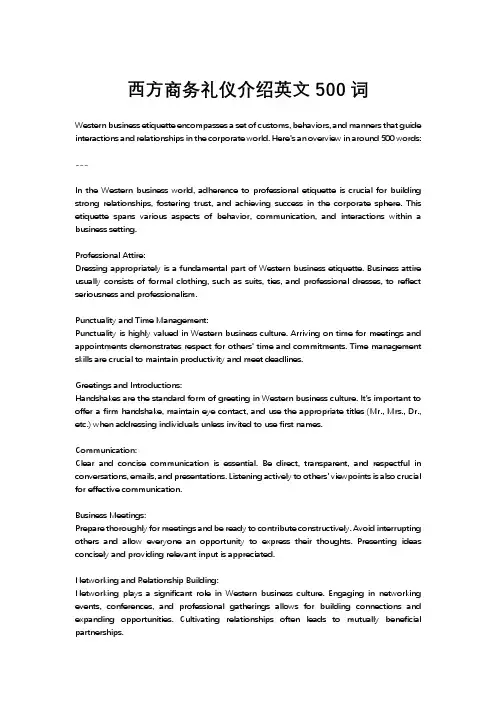
西方商务礼仪介绍英文500词Western business etiquette encompasses a set of customs, behaviors, and manners that guide interactions and relationships in the corporate world. Here's an overview in around 500 words:---In the Western business world, adherence to professional etiquette is crucial for building strong relationships, fostering trust, and achieving success in the corporate sphere. This etiquette spans various aspects of behavior, communication, and interactions within a business setting.Professional Attire:Dressing appropriately is a fundamental part of Western business etiquette. Business attire usually consists of formal clothing, such as suits, ties, and professional dresses, to reflect seriousness and professionalism.Punctuality and Time Management:Punctuality is highly valued in Western business culture. Arriving on time for meetings and appointments demonstrates respect for others' time and commitments. Time management skills are crucial to maintain productivity and meet deadlines.Greetings and Introductions:Handshakes are the standard form of greeting in Western business culture. It's important to offer a firm handshake, maintain eye contact, and use the appropriate titles (Mr., Mrs., Dr., etc.) when addressing individuals unless invited to use first names.Communication:Clear and concise communication is essential. Be direct, transparent, and respectful in conversations, emails, and presentations. Listening actively to others' viewpoints is also crucial for effective communication.Business Meetings:Prepare thoroughly for meetings and be ready to contribute constructively. Avoid interrupting others and allow everyone an opportunity to express their thoughts. Presenting ideas concisely and providing relevant input is appreciated.Networking and Relationship Building:Networking plays a significant role in Western business culture. Engaging in networking events, conferences, and professional gatherings allows for building connections and expanding opportunities. Cultivating relationships often leads to mutually beneficial partnerships.Business Cards:Exchanging business cards is common in Western business practices. Ensure your card includes accurate contact information and present it with both hands as a sign of respect.Dining Etiquette:Business dinners or lunches are common for professional engagements. Familiarity with dining etiquette is crucial, including table manners, polite conversation, and following the lead of the host regarding when to begin eating and discussing business matters.Follow-Up:After meetings or networking events, sending a follow-up email or note expressing gratitude for the opportunity to meet and discussing any future plans or actions demonstrates professionalism.Cultural Sensitivity:Respecting diversity and cultural differences is vital. Being aware of and sensitive to different cultural norms and practices contributes to successful cross-cultural communication and collaboration.In summary, mastering Western business etiquette is essential for building professional relationships, fostering credibility, and achieving success in the competitive business world. Adhering to these etiquette guidelines showcases professionalism, respect, and adaptability, which are highly valued in Western business cultures.。
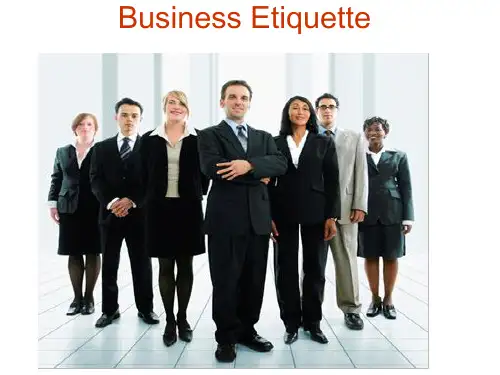
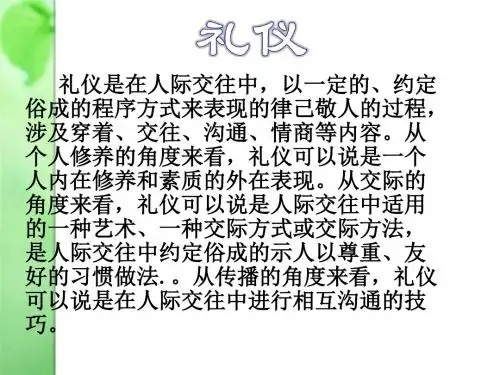

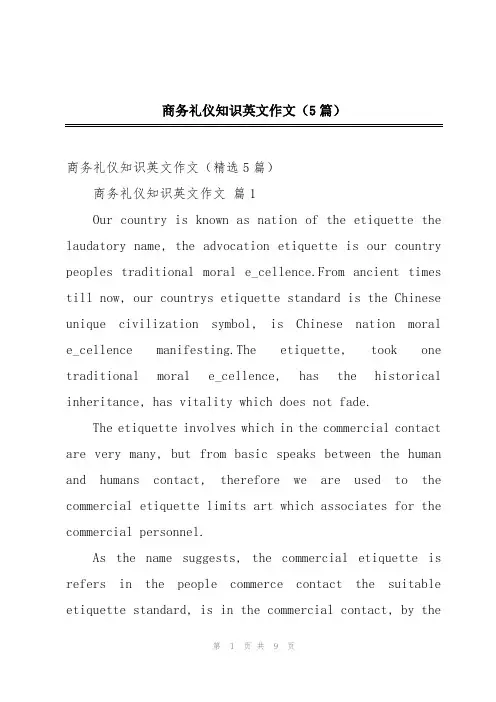
商务礼仪知识英文作文(5篇)商务礼仪知识英文作文(精选5篇)商务礼仪知识英文作文篇1Our country is known as nation of the etiquette the laudatory name, the advocation etiquette is our country peoples traditional moral e_cellence.From ancient times till now, our countrys etiquette standard is the Chinese unique civilization symbol, is Chinese nation moral e_cellence manifesting.The etiquette, took one traditional moral e_cellence, has the historical inheritance, has vitality which does not fade.The etiquette involves which in the commercial contact are very many, but from basic speaks between the human and humans contact, therefore we are used to the commercial etiquette limits art which associates for the commercial personnel.As the name suggests, the commercial etiquette is refers in the people commerce contact the suitable etiquette standard, is in the commercial contact, by theprocedure, the way which certain, is established by usage indicated respects opposite party the process and the method.The ritual stems from vulgarly, popularizes for the ritual.The commercial etiquette operationality, how is should do, how shouldnt do.Achieves in the commercial contact restrains oneself, respects other people to be able to cause the people with ease happily to associate.Not only considers for other people is the commercial contact, also is between the human and the human the normal contact basic principle.Therefore said the study and the correct utilization commerce etiquette not only is a person intrinsic tutelage and the quality e_ternal performance, also is in the human communication the suitable one kind of art, one human relations way or the human relations method, are in the human communication are established by usage show respect, the friendly custom procedure.Carries on in the human communication communicates mutually certainly must grasp the commercial etiquette the skill.Looked from individual angle that, grasps certain commercial etiquette to be helpful inenhances peoples own tutelage, beautifies own, the beautified life.And can the very effective promotion social contact, the improvement interpersonal relationship, but also is helpful to the purification social convention.Considers, a smile, a concern all can give humans by mind in warmth, and may cause own mood to be also happy along with it, why not?商务礼仪知识英文作文篇2People who go to a formal Western dinner party for the first time may be surprised by table manners in Western culture.Knowing them will help you make a good impression.Having good table manners means knowing,for e_ample,how to use knives and forks,when to drink a toast and how to behave at the table.Beside your napkin you will find a small bread roll and three glasses&one for white wine,one for the red wine,and one for water.There are two pairs of knives and forks on the table,forks on the left and knives in the right of the plate.When you see two spoons,the big one id for the suop and the samll one for the dessert.The knife and fork that are closest to yourplate are a litte bit bigger than the ones beside them.When you sit down at the table, you can take your napkin, unfold it and put it on your lap.In Chinese you sometime get a hot,damp cloth to clean your face and face and hands,whinch,however,is nat the custom in Western countries.Dinner start with a small dish, which is often called a starter.Sime people pray before they start eating , and other people may keep silent for a moment. Then you can sayEnjoy your mealto each other and everybody start eating.For the starter,which you eat with the smaller pair,you keep the knife in your right hand and the fork in your left.After the starter you will get a bowl of soup&but only one boel of soup and never ask for a seconf serving.The ne_t dish is the main course.Many Westerners think the chicken breast with its tender white flesh is the best part of the bird. Some people can use their fingers when they eating chicken or other birds,but never touch beef or other meat in bones.It is polite to finish eatingeverthing on your plate,so dont take more food than you need.At table ,you should try to speak quietly and smile a lot,but do not laugh all the time.Most Westerners like soft drink if they will drive home.Many of them drink white or red wine with the food.When drinking to someones health,you raise your glasses,but the glasses should not touch. The custom of toasting in some parts of China is to finish the drink at once,but Westerners usually take only a sip.For drinking during a dinner,the best advic is never to drink too much.Table manners change over time.They follow the fashion of the day .Beside,table manners are only important at formal dinner parties.If youre not sure what to do ,you can always follow your hosts.Although good manners always make you look good,you do not need to worry about all these rules while having dinner with your friends or family.商务礼仪知识英文作文篇3No matter when and where, in no circumstances can wedeny the great importance of manners.Firstly, a person with good manners is often considered to be more trustworthy and easygoing, which helps him make more friends and get needed help from others. Besides, people are more willing to show their respect to the polite people and cooperate with them, bringing them many opportunities to change. Still most importantly, being polite helps reduce misunderstanding between people, contributing to a harmonious and enjoyable relationships.Having good manners is regarded as an important part when judging a people whether he or she is a person of good taste, and using polite words is a sign of good manners. We use polite words in our daily life without realizing it. please thank you and sorry are the three words we use most frequently, which bring us magic power.Being polite is the first and most important step to develop good relationship since polite words make it easy for people to communicate with others. Being polite show your respect to others so that they are likely to buildrelations with you. Always saying polite words will make others feel comfortable and repected, then when you need help they are willing to give you a hand. Moreover, using polite words can bring you friends who has the same character with you,as the old saying goes Birds of a feather flock together. The people around you may build a better you.商务礼仪知识英文作文篇4Manners are important to happy relations among people. No one likes a person with bad manners. Good manners mean good behaviors in social communication. A person with good manners is always agreeable companion, because he is always thinking of others and respects others.A person with good manners never laughs at people when they are in trouble. Instead,he tries to offer help. when he asks for something, he says please and when he receives something, he always says thanks。
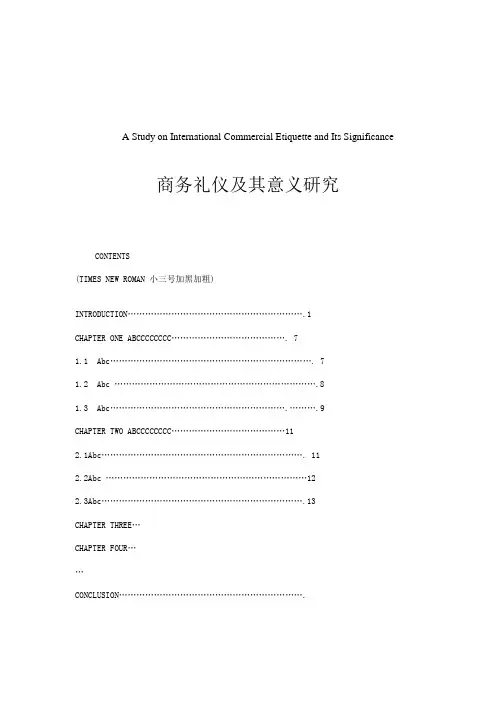
A Study on International Commercial Etiquette and Its Significance商务礼仪及其意义研究CONTENTS(TIMES NEW ROMAN 小三号加黑加粗)INT RODUCTION (1)CHAPTER ONE ABCCCCCCCC (7)1.1 Abc (7)1.2 Abc (8)1.3 Abc (9)CHAPTER TWO ABCCCCCCCC (11)2.1Abc (11)2.2Abc (12)2.3Abc (13)CHAPTER THREE…CHAPTER FOUR……CONCLUSION……………………………………………………….REFERENCES………………………………………………………内容摘要当今世界,各国之间交流频繁,礼仪之论不再局限在国内,而成了国际交往需要重视的问题。
同时,不可否认的是因为各国价值观念,文化,历史背景的不同,在礼仪实践中也存在差异。
没有一个统一的标准,这些差异,只有一些约定俗成的东西,大家都基本认同,在交往中共同遵守。
所以从事国际交流,国际商务的人,不论是政治,经济,文化,军事哪个领域,对这些礼仪都要熟悉。
国际商务和涉外工作也已经不再是少数人的专利,而是成为越来越多人的职业选择。
在这个“以人为本”的时代,如何在跨文化的交流中,尽可能地尊重他人,又充分维护自己的尊严,是一项非常重要而具有挑战意义的事情,而国际商务礼仪就是市场竞争和国际商务大环境中人们必备的一门知识。
本文对商务礼仪进行了明确的界定,对商务礼仪的内容与归属、特征与原则、功能与操作进行了系统的阐述,较为详细地论述了商务介绍与问候,迎送礼仪,宴请规则,谈判礼仪以及柬书礼仪,同时阐明了国际商务礼仪对于商务人员的重要意义。
AbstractNowadays different nations communicate frequently. Etiquette is becoming an imp ortant issue, which is not confined only in the domestic affairs. At the same t ime, the values vary from nations to nations, so does the practice of etiquette. There is not an acknowledged standard and it is only a set of established rule s which are obeyed by all the people. Therefore, a business man should be familiar with all the protocols in all fields, such as politics, economics, and cult ure and military.International business is no longer the privilege of the minority of people. Mo re and more people prefer to go into business. In the era of human-oriented soc iety, how to respect others and maintain one’s dignity becomes a challenge. In ternational business etiquette is the basic knowledge which should be applied i n the competition in the international business environment. .This thesis gives a clear definition of commercial etiquette and systematically explains its contents, categorizations, features, principles, functions and pr actices. It illustrates the business introduction, greetings, welcoming guest s, entertaining visitors, international business negotiation, practical busines s English writing in detail. It also shows the significance of the commercial e tiquette.INTRODUCTIONBusiness communication and business etiquetteIn an era of globalization, understanding the basics of etiquette and protocol that is, the type of behavior that others expect of you in both informal and fo rmal settings—is an important skill. It can instill an individual with confide nce to handle almost any situation in any culture and allow a businessperson t concentrate on the deal at hand rather than worrying about such distractions as which fork to use or which hand to use for passing food. Without an understand ing of the basics of etiquette and protocol, you risk coming off as a boorish N eanderthal. You may even put your company’s image at risk or risk potential fa ilure in the formation of key business relationships that are vital to global success. Finally, a well-honed sense and appreciation of local customs etiquette and protocol can make you stand out in a competitive global market.In order to comprehend the International Commercial Etiquette, we should find o ut the full contents of its activities.Just as its name implies, the International Commerce indicates that there is on ly one purpose of commercial activities, that is, to realize, increase and conv ert the value. One sales its goods to the other to realize the market value of this production, at the same time, the value is increased in this process, ther efore, the seller gains some profits, which will be conversed into the value fo rm needed in the next commercial campaign, no matter it is cash, products or se rvice, thus, makes preparation of the following commercial activity. International Commercial is based on the approbation and reception of each othe r’s trade motivations between the bargainers. Especially nowadays, this kind o f activity is an action in which both sides are voluntary and almost without an y force to press on. Besides, this kind of commercial activity goes along under the condition of free trade all over the world. Therefore, in the atmosphere o f international commerce, the traders have the same quality, intent and environ ment, as well as threeCHAPTER ONEABCCONCLUSIONIncreased globalization has been one of the most important developments in thepast decade. The Internet has been instrumental in accelerating the growth of b usiness across borders. The ability to effectively conduct business with tradin g partners around the world is essential in the twenty-first century. Savvy com panies view the development of international business etiquette and communicati on skills as a strategy to distinguish their company from competing firms. One business educator has cautioned, "Being closely attuned to the orientations of diverse trading partners is an increasingly important advantage in the highly c ompetitive global marketplace, where only the very best thrive." Colleges and u niversities have responded to this need by integrating international perspectiv es into the curricula. Business schools in particular have worked to internatio nalize the curriculum, partially through the expansion of international busines s communication courses. Even student clubs have recognized the need for enhanc ed understanding of other cultures, sponsoring popular business etiquette dinne rs and workshops on global business protocol.Proper etiquette in today’s business world goes well beyond basic ta ble manner s( they are, after all, a given in most cultures) and common courtesies (allowi ng an esteemed colleague or superior to precede you through a doorway, for exam ple). Think of all the elements that go into making a first impression. The lis t is lengthy. There is your manner of dress, your professional appearance, the color of your dress or tie, your body language, handshake, posture, amount of e ye contact on introduction, where you put your hands, how you accept a business card and how you present yours as well as the actual content of the card-and y ou haven’t even sat down to begin talks.Regardless of the culture, proper etiquette means maintaining your own values w hile respecting those of others. It does not mean slavishly following the rituals and practices of others to please your host. If you make an effort at the la nguage, at understanding the basics of common courtesy, and avoid any offensive acts, don’t be overly concerned about the subtleties- at least the first time around. To be honest, not that much is really expected of the first time visito r to another culture, thought a deeper understanding will be expected each time you visit. The value in understanding etiquette and protocol id in the confide nce it gives you and the impression it makes on colleagues.Although what is covered is handled well, there are some areas that could have received greater attention. For example, there is little discussion of the diff erences among the various countries and cultures in each continent. And I’d ha ve liked more on business etiquette and the use of humor, entertainment and let ters.We previously discussed the importance of business etiquette in daily business activities in terms of "business introduce", dining, business invitations. Ther e are some other important business etiquettes, such as the proper attitude tow ards foreign cultures, music and arts, the respect for their dining habits, hol idays and religions. We will not discuss them in details because of the limited scope of this paper. Shortly put, understanding more about foreign business et iquettes put us in a good position to deal with all kinds of business occasions and hence facilitate the development of global trade.References:[1] Grace Fox. Everyday Etiquette, A Guide to Modern Manners[M].[2] Mary Jane McCaffree, Pauline Innis. The Complete Handbook [8] R.G. Feltha m. Diplomatic Handbook[M] .[M]. Time-Life Custom Publishing.[3] Williams-Sonoma, Inc. and Wedon Owen Inc. The Bar GuideBerkley Publishing Group with Doubleday Direct, Inc, 1998.of Diplomatc i[M],. Official and Social Usage.[4] 杜培. 现代礼仪学[M]. 中国工人出版社, 1997.[5] 韩欲和, 张彦. 涉外礼仪[M]. 译林出版社, 1996.[6] 金正昆. 涉外礼仪教程[M]. 中国人民大学出版社, 1998.[7] 李斌. 国际礼仪与交际礼节[M]. 世界知识出版社, 1985.[8] 李天民. 现代国际礼仪知识[M]. 世界知识出版社, 1999.[9] 宋长美. 对外交往中的礼仪礼节[M]. 黑龙江人民出版社,1996.(中文参考文献按拼音顺序排,英文按字母顺序排。
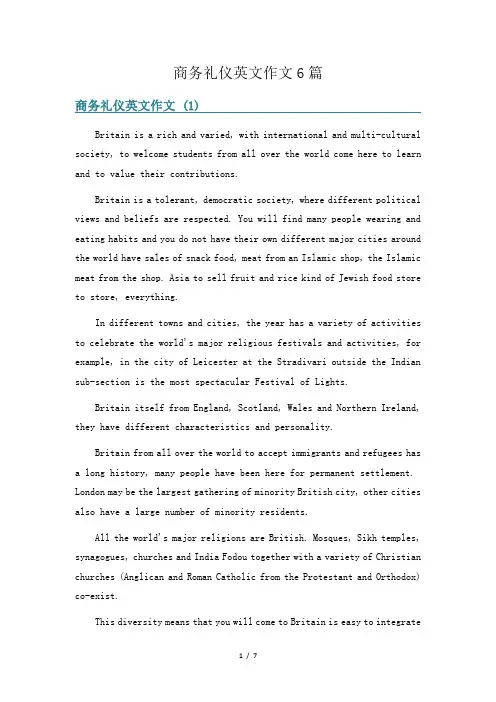
商务礼仪英文作文6篇商务礼仪英文作文 (1) Britain is a rich and varied, with international and multi-culturalsociety, to welcome students from all over the world come here to learnand to value their contributions.Britain is a tolerant, democratic society, where different politicalviews and beliefs are respected. You will find many people wearing andeating habits and you do not have their own different major cities aroundthe world have sales of snack food, meat from an Islamic shop, the Islamicmeat from the shop. Asia to sell fruit and rice kind of Jewish food storeto store, everything.In different towns and cities, the year has a variety of activitiesto celebrate the world's major religious festivals and activities, forexample, in the city of Leicester at the Stradivari outside the Indiansub-section is the most spectacular Festival of Lights.Britain itself from England, Scotland, Wales and Northern Ireland,they have different characteristics and personality.Britain from all over the world to accept immigrants and refugees hasa long history, many people have been here for permanent settlement.London may be the largest gathering of minority British city, other citiesalso have a large number of minority residents.All the world's major religions are British. Mosques, Sikh temples,synagogues, churches and India Fodou together with a variety of Christianchurches (Anglican and Roman Catholic from the Protestant and Orthodox)co-exist.This diversity means that you will come to Britain is easy to integrateinto Britain's multi-ethnic society. You will also come from differentreligious and ethnic groups and people contacts, enhance understandingof different cultures.商务礼仪英文作文 (2) 今天听了陈彦斯曼老师的课,我从中受益匪浅,这对我以后无论在生活中还是工作中都有很大的影响,首先,就是心态问题,心态可以决定命运,一个好的心态能够使我们快乐,每个人看待事物的角度不一样的,我们要积极的看待问题,我们在工作中都保持着好的心态,不要因为生活中的一点事儿,影响自己的心情,从而影响自己的工作。
商务礼仪英语范文篇一:中西方商务礼仪Different Business Etiquette between China and theWestI. IntroductionBusiness etiquette is a kind of civilization accumulation of human becomes fixed during the business communication, being handed down from generation to generation. It is also a kind of standard behavior observed by the businessmen in their communication. Different countries have different culture traditions, so their business etiquette is also different from one another. There are great cultural differences between the cultural cores of Confucian in China and the cores of Christian in the West, which leads to some differences in the businessetiquette between China and West.II. The Influence of Cultural Differences on Business Etiquette Differences Between China and the West Generally speaking, the differences on business etiquette between China and the West are influenced by several cultural factors, such as values, view of time, view of space, view of diet, verbal habits and nonverbal. The paper mainly focuses on time and space approach.From the approach of timeThoreau once said,“If a man does not keep pace with his companions, perhaps it is because he hears a different drummer.”Now, we use the phrase “the beat of a different drummer”to explain any different pace of life. The attitudes toward time vary from culture to culture. And it is understandable that people of different cultures hold different views toward time. When it comes to international business,the view of time can be divided into two types, such as monochromic time and polychromic time. Countries that follow monochromic time perform only one major activity at a time, while countries obeying polychromic time perform several activities simultaneously.The United States is a monochromic culture. In monochromic culture, time is regarded as something tangible. Time is seen as linear and manageable. Therefore, people concentrate on the task at hand, taking time commitments seriously and being accustomed to short-term relationships. For example, in the West, time is a kind ofprecious and limited resource. The business people attend the business meeting on time. If someone was late, he would be considered to be lack of honesty. And the business people always expect to solve their business problems withintwenty to thirty minutes. In monochromic cultures, it is considered a rude to do two things at once, such as reading a journal in a meeting or answering the telephone while someone is in your office. Schedules and keeping appointments are consistent with value of people in monochromic cultures.Chinese people are typical example of polychromic cultures. Chinese people are well adapted to doing several things at once and do not mind interruptions. In their opinion, people are more important than schedules to members of polychromic cultures. Their lifestyle is less organized than that of monochromic people. In their eyes time is just like a circle that does not have the end. So Chinese people are highly distracted and subject to interruptions. They consider time to be casual and flexible. For example, to most Chinese today, time simply flows from one day tothe next. If a job is not done today, maybe it will be done the next day or the next. And the business meeting would generally last for several hours.Compared with the Westerners, few Chinese equate time with money. When foreign businessmen arrive in China, most Chinese will make them settle down in hotels and give them an opportunity to rest up. Because Chinese do not expect them to immediately rush into business. However, generally this arrangement will be politely but firmly rejected by visitors. When Chinese are involved in international business, they will get familiar with the Western concept“time is money”. But they do not automatically relate it to the pace of business.Besides, Chinese do not pay much attention to the appointment. Sometimes even if there is an appointment, the Chinese would not stick to it seriously.When people of different cultures interact, misunderstandings often arise as a result of different time view. For instance, in the Western countries, the business contact would be pre-arranged within three to four weeks. Business people pre-arrange the business contact at least two weeks in America. The appointment is holy to Americans. In the business communication, if someone asks to have a business contact at the lastminute, he will be considered to make trouble or insult the others. On the contrary, the Chinese people pay more attention to relationship. In their business activity, if there is an important person need to be contacted, they could cancel the primary appointment to meet him. It is unacceptable to American business people. This example shows the cultural differences in time sense between China and the West. And it becomes increasinglyimportant as modern business communications put more and more businessmen in daily contact. If we are to avoid misunderstanding, we need to know better about our own cultural biases and those of others.From the approach of spaceSpace, is the physical distance between people when they are interacting. It is deeply influenced by culture. When people are having a conversation, the distance between them changes dramatically from one culture to another.Generally speaking, there are four zones when people interact: the intimate zone, the personal zone, the social zone, and the public zone. The intimate zone, less than meters, is reserved for a close friend. And it appears briefly when the business colleagues shake hands. The personal zone, from meters to meters, is used for giving instructions to someonein an office. The social zone, from to meters, is used for impersonal and formal business meeting. The public distance, over meters, is the most formal zone.Americans tend to need more spaces than Chinese. When having a conversation with Chinese, Americans will back away for the Chinese partner is standing too close. Standing too close to someone in the United States may leave a bad impression on the others, as it implies the person is upset, overbearing, or he is making sexual advances. These negative positions should be avoided in the United States. In China, people prefer to stand close to each other and they think it is a normal and friendly way to communicate with each other.Besides, the arrangement of desks, chairs, and conference table also feature the different styles of communication. When the United States people areconversing, they prefer the face-to-face arrangement of chairs whereas the Chinese prefer side-by-side arrangement. They like this arrangement because they could avoid directeye contact through it.IV. ConclusionWith the globalization of the world economy, organizations are culturally diverse in handling all kinds of business activities, especially multinational cooperation. More and more business people have become aware of the strong impact from culture. And they should have a good understanding of the other business etiquette culture beforehand, which is beneficial for both sides of the business people. Only in this way will it be possible for them to expand their business and make it more prosperous.篇二:商务礼仪英语在苏州竹辉饭店的应用商务礼仪英语在苏州竹辉饭店的应用摘要商务礼仪是酒店服务顾客的基本职业礼仪,作为服务的一种,商务礼仪英语在各个酒店中均有大大小小的普及和应用。
简短商务礼仪英文版简短商务礼仪英文版发布时间:2020-04-15在商务场合中,应该怎么样用英语得体呢?下面是宝岛优品小编搜集整理的一些内容,希望对你有帮助。
商务礼仪的英文版1被国际社会公认的第一礼俗是什么?What s the fit custom in the international society? 被国际社会公认的第一礼俗是什么?Lady fit .女士优先。
2社交中的三A原则指的是什么?What is the ThreeA principle in social communicatio? 社交中的三A 原则指的是什么?Accept 接受对方;Appreciate 重视欣赏对方;Admire 赞美敬佩对方。
3在国际礼仪中,TOP指的是哪三个原则?What does TOP mean in the international etiquette? 在国际礼仪中,TOP指的是哪三个原则?Time时间;Objective目的;Place 地点。
4和西方人交谈时,应避免哪八个话题?When you are talking with people from western countries, eight topics should beavoided. What are they? 和西方人交谈时,应避免哪八个话题?Age, marital status, salary, experience, address, peonal life,religious belief, politics, and opinio about other people.年龄,婚否,收入,经历,住址,个人生活,宗教信仰,政治见解,以及对他人的看法。
5哪三个词在社交场合最常用?Which three words are the most common ones in social life? 哪三个词在社交场合最常用?Thanks谢谢;Excuse me (sorry) 对不起;Please 请。
Different Business Etiquette between China and theWestI. IntroductionBusiness etiquette is a kind of civilization accumulation of human being.It becomes fixed during the business communication, being handed down from generation to generation. It is also a kind of standard behavior observed by the businessmen in their communication. Different countries have different culture traditions, so their business etiquette is also different from one another. There are great cultural differences between the cultural cores of Confucian in China and the cores of Christian in the West, which leads to some differences in the business etiquette between China and West.II. The Influence of Cultural Differences on Business Etiquette Differences Between China and the WestGenerally speaking, the differences on business etiquette between China and the West are influenced by several cultural factors, such as values, view of time, view of space, view of diet, verbal habits and nonverbal. The paper mainly focuses on time and space approach.2.1 From the approach of timeThoreau once said,“If a man does not keep pace with his companions, perhaps it is because he hears a different drummer.”Now, we use the phrase “the beat of a different drummer”to explain any different pace of life. The attitudes toward time vary from culture to culture. And it is understandable that people of different cultures hold different views toward time. When it comes to international business, the view of time can be divided into two types, such as monochromic time and polychromic time. Countries that follow monochromic time perform only one major activity at a time, while countries obeying polychromic time perform several activities simultaneously. (Jeanette S. 113)The United States is a monochromic culture. In monochromic culture, time is regarded as something tangible. Time is seen as linear and manageable. Therefore, people concentrate on the task at hand, taking time commitments seriously and being accustomed to short-term relationships. For example, in the West, time is a kind ofprecious and limited resource. The business people attend the business meeting on time. If someone was late, he would be considered to be lack of honesty. And the U.S. business people always expect to solve their business problems within twenty to thirty minutes. In monochromic cultures, it is considered a rude to do two things at once, such as reading a journal in a meeting or answering the telephone while someone is in your office. Schedules and keeping appointments are consistent with value of people in monochromic cultures.Chinese people are typical example of polychromic cultures. Chinese people are well adapted to doing several things at once and do not mind interruptions. In their opinion, people are more important than schedules to members of polychromic cultures. Their lifestyle is less organized than that of monochromic people. In their eyes time is just like a circle that does not have the end. So Chinese people are highly distracted and subject to interruptions. They consider time to be casual and flexible. For example, to most Chinese today, time simply flows from one day to the next. If a job is not done today, maybe it will be done the next day or the next. And the business meeting would generally last for several hours.Compared with the Westerners, few Chinese equate time with money. When foreign businessmen arrive in China, most Chinese will make them settle down in hotels and give them an opportunity to rest up. Because Chinese do not expect them to immediately rush into business. However, generally this arrangement will be politely but firmly rejected by visitors. When Chinese are involved in international business, they will get familiar with the Western concept“time is money”. But they do not automatically relate it to the pace of business.Besides, Chinese do not pay much attention to the appointment. Sometimes even if there is an appointment, the Chinese would not stick to it seriously. When people of different cultures interact, misunderstandings often arise as a result of different time view. For instance, in the Western countries, the business contact would be pre-arranged within three to four weeks. Business people pre-arrange the business contact at least two weeks in America. The appointment is holy to Americans. In the business communication, if someone asks to have a business contact at the lastminute, he will be considered to make trouble or insult the others. On the contrary, the Chinese people pay more attention to relationship. In their business activity, if there is an important person need to be contacted, they could cancel the primary appointment to meet him. It is unacceptable to American business people. This example shows the cultural differences in time sense between China and the West. And it becomes increasingly important as modern business communications put more and more businessmen in daily contact. If we are to avoid misunderstanding, we need to know better about our own cultural biases and those of others. (Wen Yaoqing, 127) 2.2 From the approach of spaceSpace, is the physical distance between people when they are interacting. It is deeply influenced by culture. When people are having a conversation, the distance between them changes dramatically from one culture to another.Generally speaking, there are four zones when U.S. people interact: the intimate zone, the personal zone, the social zone, and the public zone. The intimate zone, less than 0.46 meters, is reserved for a close friend. And it appears briefly when the business colleagues shake hands. The personal zone, from 0.46 meters to 1.2 meters, is used for giving instructions to someone in an office. The social zone, from 1.2 to 3.6 meters, is used for impersonal and formal business meeting. The public distance, over 3.6 meters, is the most formal zone. (Lillian H. 83)Americans tend to need more spaces than Chinese. When having a conversation with Chinese, Americans will back away for the Chinese partner is standing too close. Standing too close to someone in the United States may leave a bad impression on the others, as it implies the person is upset, overbearing, or he is making sexual advances. These negative positions should be avoided in the United States. In China, people prefer to stand close to each other and they think it is a normal and friendly way to communicate with each other.Besides, the arrangement of desks, chairs, and conference table also feature the different styles of communication. When the United States people are conversing, they prefer the face-to-face arrangement of chairs whereas the Chinese prefer side-by-side arrangement. They like this arrangement because they could avoid directeye contact through it.IV. ConclusionWith the globalization of the world economy, organizations are culturally diverse in handling all kinds of business activities, especially multinational cooperation. More and more business people have become aware of the strong impact from culture. And they should have a good understanding of the other business etiquette culture beforehand, which is beneficial for both sides of the business people. Only in this way will it be possible for them to expand their business and make it more prosperous.ReferencesDu, Li.(2004).Comparison of Wine Culture between China and the West.Culinary Science Journal of Yangzhou University,(l):l-4 .Jeanette S.,Martin.Global Business Etiquette.Westport,CT:Praeger,2006.Lillian H., Chaney. Intercultural Business Communication. Upper Saddle River, NJ : Prentice Hall, 2004.Wen,Yaoqing.“Comparison analysis of multinational business culture”. 《International business research》,4(2001):p121-30。